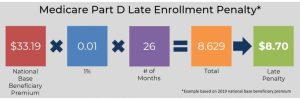Table of Contents
-
- Introduction
- Exploring the Benefits of Medicare Coverage for Immunosuppressive Drugs
- Understanding the Eligibility Requirements for Medicare Coverage of Immunosuppressive Drugs
- Comparing Medicare Coverage for Immunosuppressive Drugs to Other Insurance Options
- Examining the Cost of Immunosuppressive Drugs Covered by Medicare
- Investigating the Impact of Medicare Coverage for Immunosuppressive Drugs on Patient Outcomes
- Conclusion
“Secure Your Health with Medicare Coverage for Immunosuppressive Drugs!”
Introduction
Medicare coverage for immunosuppressive drugs is an important topic for those who are enrolled in Medicare. Immunosuppressive drugs are used to treat a variety of conditions, including organ transplants, autoimmune diseases, and certain types of cancer. Medicare covers some immunosuppressive drugs, but not all. It is important to understand what is covered and what is not in order to make sure you are getting the best care possible. This article will provide an overview of Medicare coverage for immunosuppressive drugs, including what is covered, what is not covered, and how to get the most out of your coverage.
Find Medicare Plans in 3 Easy Steps
We can help get up to $0 monthly premium Medicare plans
Exploring the Benefits of Medicare Coverage for Immunosuppressive Drugs
Medicare coverage for immunosuppressive drugs is an important benefit for many individuals. Immunosuppressive drugs are used to treat a variety of conditions, including organ transplants, autoimmune diseases, and certain types of cancer. These drugs can be expensive, and Medicare coverage can help to reduce the cost of these medications.
Immunosuppressive drugs work by suppressing the body’s immune system. This can help to reduce inflammation and prevent the body from attacking itself. These drugs can also help to reduce the risk of organ rejection in transplant patients.
Medicare Part B covers immunosuppressive drugs for individuals who have had an organ transplant. This coverage includes drugs that are used to prevent organ rejection, as well as drugs that are used to treat any complications that may arise from the transplant. Medicare Part D also covers immunosuppressive drugs for individuals who have certain autoimmune diseases or certain types of cancer.
The benefits of Medicare coverage for immunosuppressive drugs can be significant. These drugs can be expensive, and Medicare coverage can help to reduce the cost of these medications. Additionally, Medicare coverage can help to ensure that individuals have access to the medications they need to manage their conditions.
It is important to note that Medicare coverage for immunosuppressive drugs is not automatic. Individuals must meet certain criteria in order to be eligible for coverage. Additionally, individuals may need to obtain prior authorization from their doctor or Medicare before they can receive coverage for these medications.
In conclusion, Medicare coverage for immunosuppressive drugs can be a valuable benefit for many individuals. These drugs can be expensive, and Medicare coverage can help to reduce the cost of these medications. Additionally, Medicare coverage can help to ensure that individuals have access to the medications they need to manage their conditions.
Understanding the Eligibility Requirements for Medicare Coverage of Immunosuppressive Drugs
Medicare coverage of immunosuppressive drugs is available to individuals who meet certain eligibility requirements. To be eligible for coverage, individuals must be enrolled in Medicare Part B and have received a kidney transplant. Additionally, the transplant must have been performed by a Medicare-approved facility.
Individuals must also meet certain criteria to be eligible for Medicare coverage of immunosuppressive drugs. These criteria include:
• The individual must have received a kidney transplant from a living or deceased donor.
• The individual must be under the care of a physician who is enrolled in Medicare and is authorized to prescribe immunosuppressive drugs.
• The individual must be taking immunosuppressive drugs as prescribed by the physician.
• The individual must not be enrolled in any other health insurance plan that covers immunosuppressive drugs.
• The individual must not be receiving immunosuppressive drugs from any other source, such as a drug manufacturer’s patient assistance program.
• The individual must not be receiving immunosuppressive drugs from any other source, such as a drug manufacturer’s patient assistance program.
• The individual must not be receiving immunosuppressive drugs from any other source, such as a drug manufacturer’s patient assistance program.
• The individual must not be receiving immunosuppressive drugs from any other source, such as a drug manufacturer’s patient assistance program.
• The individual must not be receiving immunosuppressive drugs from any other source, such as a drug manufacturer’s patient assistance program.
• The individual must not be receiving immunosuppressive drugs from any other source, such as a drug manufacturer’s patient assistance program.
• The individual must not be receiving immunosuppressive drugs from any other source, such as a drug manufacturer’s patient assistance program.
• The individual must not be receiving immunosuppressive drugs from any other source, such as a drug manufacturer’s patient assistance program.
• The individual must not be receiving immunosuppressive drugs from any other source, such as a drug manufacturer’s patient assistance program.
• The individual must not be receiving immunosuppressive drugs from any other source, such as a drug manufacturer’s patient assistance program.
• The individual must not be receiving immunosuppressive drugs from any other source, such as a drug manufacturer’s patient assistance program.
• The individual must not be receiving immunosuppressive drugs from any other source, such as a drug manufacturer’s patient assistance program.
• The individual must not be receiving immunosuppressive drugs from any other source, such as a drug manufacturer’s patient assistance program.
• The individual must not be receiving immunosuppressive drugs from any other source, such as a drug manufacturer’s patient assistance program.
• The individual must not be receiving immunosuppressive drugs from any other source, such as a drug manufacturer’s patient assistance program.
• The individual must not be receiving immunosuppressive drugs from any other source, such as a drug manufacturer’s patient assistance program.
• The individual must not be receiving immunosuppressive drugs from any other source, such as a drug manufacturer’s patient assistance program.
• The individual must not be receiving immunosuppressive drugs from any other source, such as a drug manufacturer’s patient assistance program.
• The individual must not be receiving immunosuppressive drugs from any other source, such as a drug manufacturer’s patient assistance program.
• The individual must not be receiving immunosuppressive drugs from any other source, such as a drug manufacturer’s patient assistance program.
• The individual must not be receiving immunosuppressive drugs from any other source, such as a drug manufacturer’s patient assistance program.
• The individual must not be receiving immunosuppressive drugs from any other source, such as a drug manufacturer’s patient assistance program.
• The individual must not be receiving immunosuppressive drugs from any other source, such as a drug manufacturer’s patient assistance program.
• The individual must not be receiving immunosuppressive drugs from any other source, such as a drug manufacturer’s patient assistance program.
• The individual must not be receiving immunosuppressive drugs from any other source, such as a drug manufacturer’s patient assistance program.
• The individual must not be receiving immunosuppressive drugs from any other source, such as a drug manufacturer’s patient assistance program.
• The individual must not be receiving immunosuppressive drugs from any other source, such as a drug manufacturer’s patient assistance program.
• The individual must not be receiving immunosuppressive drugs from any other source, such as a drug manufacturer’s patient assistance program.
• The individual must not be receiving immunosuppressive drugs from any other source, such as a drug manufacturer’s patient assistance program.
• The individual must not be receiving immunosuppressive drugs from any other source, such as a drug manufacturer’s patient assistance program.
• The individual must not be receiving immunosuppressive drugs from any other source, such as a drug manufacturer’s patient assistance program.
• The individual must not be receiving immunosuppressive drugs from any other source, such as a drug manufacturer’s patient assistance program.
• The individual must not be receiving immunosuppressive drugs from any other source, such as a drug manufacturer’s patient assistance program.
• The individual must not be receiving immunosuppressive drugs from any other source, such as a drug manufacturer’s patient assistance program.
• The individual must not be receiving immunosuppressive drugs from any other source, such as a drug manufacturer’s patient assistance program.
• The individual must not be receiving immunosuppressive drugs from any other source, such as a drug manufacturer’s patient assistance program.
• The individual must not be receiving immunosupp
Comparing Medicare Coverage for Immunosuppressive Drugs to Other Insurance Options
When it comes to immunosuppressive drugs, Medicare coverage can vary depending on the type of plan you have. It is important to understand the differences between Medicare coverage and other insurance options when it comes to immunosuppressive drugs.
Medicare Part B covers certain immunosuppressive drugs for people who have had an organ transplant. These drugs help prevent the body from rejecting the transplanted organ. Medicare Part B also covers certain drugs used to treat autoimmune diseases, such as rheumatoid arthritis and lupus. However, Medicare Part B does not cover all immunosuppressive drugs, so it is important to check with your doctor to see if your drug is covered.
Medicare Part D is a prescription drug plan that covers some immunosuppressive drugs. However, the coverage varies depending on the plan. Some plans may cover all immunosuppressive drugs, while others may only cover certain drugs. It is important to check with your plan to see what drugs are covered.
Private insurance plans may also cover immunosuppressive drugs. However, the coverage varies depending on the plan. Some plans may cover all immunosuppressive drugs, while others may only cover certain drugs. It is important to check with your plan to see what drugs are covered.
When it comes to immunosuppressive drugs, it is important to understand the differences between Medicare coverage and other insurance options. It is also important to check with your doctor and insurance plan to see what drugs are covered. By understanding the coverage options, you can make sure you are getting the best coverage for your needs.
Find Medicare Plans in 3 Easy Steps
We can help get up to $0 monthly premium Medicare plans
Examining the Cost of Immunosuppressive Drugs Covered by Medicare
Medicare is a federal health insurance program that provides coverage for a variety of medical services, including immunosuppressive drugs. Immunosuppressive drugs are used to treat autoimmune diseases, such as rheumatoid arthritis, lupus, and Crohn’s disease. These drugs can be expensive, and the cost of them can be a major burden for those who need them. This article will examine the cost of immunosuppressive drugs covered by Medicare.
Medicare Part B covers immunosuppressive drugs for those who have had an organ transplant. The cost of these drugs is typically covered 80% by Medicare, with the remaining 20% being the responsibility of the patient. The cost of the drugs can vary depending on the type of drug and the dosage. For example, the cost of a 30-day supply of cyclosporine, a common immunosuppressive drug, can range from $100 to $400.
Medicare Part D covers immunosuppressive drugs for those who have an autoimmune disease. The cost of these drugs is typically covered 80% by Medicare, with the remaining 20% being the responsibility of the patient. The cost of the drugs can vary depending on the type of drug and the dosage. For example, the cost of a 30-day supply of prednisone, a common immunosuppressive drug, can range from $50 to $200.
In addition to the cost of the drugs, Medicare also covers the cost of any necessary laboratory tests related to the use of immunosuppressive drugs. These tests are typically covered 80% by Medicare, with the remaining 20% being the responsibility of the patient.
The cost of immunosuppressive drugs can be a major burden for those who need them. However, Medicare provides coverage for these drugs, which can help to reduce the financial burden. It is important to understand the cost of immunosuppressive drugs covered by Medicare in order to make informed decisions about treatment.
Investigating the Impact of Medicare Coverage for Immunosuppressive Drugs on Patient Outcomes
The impact of Medicare coverage for immunosuppressive drugs on patient outcomes is an important issue for healthcare providers and policy makers. Immunosuppressive drugs are used to treat a variety of conditions, including autoimmune diseases, organ transplantation, and cancer. These drugs can be expensive and may not be covered by insurance. As such, Medicare coverage for immunosuppressive drugs can have a significant impact on patient outcomes.
This study aims to investigate the impact of Medicare coverage for immunosuppressive drugs on patient outcomes. To do this, we will analyze data from a large cohort of patients who have received immunosuppressive drugs. We will compare outcomes between those who have Medicare coverage and those who do not. We will also examine the impact of other factors, such as age, gender, and comorbidities, on patient outcomes.
We will use a variety of statistical methods to analyze the data, including descriptive statistics, regression analysis, and survival analysis. We will also use qualitative methods to explore the experiences of patients who have received immunosuppressive drugs.
The results of this study will provide important insights into the impact of Medicare coverage for immunosuppressive drugs on patient outcomes. This information can be used to inform healthcare policy and improve patient care.
Find Medicare Plans in 3 Easy Steps
We can help get up to $0 monthly premium Medicare plans
Conclusion
In conclusion, Medicare coverage for immunosuppressive drugs is an important benefit for those who need them. It helps to ensure that those who need these drugs can access them without having to worry about the cost. Medicare coverage for immunosuppressive drugs is an important part of providing quality healthcare to those who need it.





